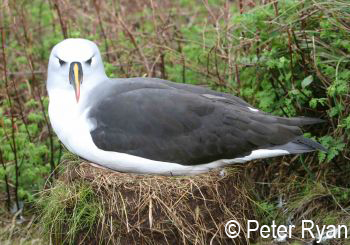The Royal Society for the Protection of Birds (RSPB) received a grant last month to assess the conservation status of the Endangered and ACAP-listed Atlantic Yellow-nosed Albatross Thalassarche chlororhynchos on the main island of Tristan da Cunha, part of the United Kingdom Overseas Territory of St Helena, Ascension and Tristan da Cunha in the South Atlantic (click here).

An Atlantic Yellow-nosed Albatross incubates on its pedestal nest
The grant follows on from the ACAP Advisory Committee identifying the need for a census of the main island's population of yellow-nosed albatrosses so that a global population estimate can be made and the species' conservation status can be clarified.

Atlantic Yellow-nosed Albatrosses on Inaccessible Island, with the main island of Tristan da Cunha on the horizon
Photographs by Peter Ryan
The funding to the level of UK£82 081 comes from the second round of the UK’s Overseas Territories Environment and Climate Fund, known also as Darwin Plus, that was established last year with funds from the UK’s Department for Environment, Food and Rural Affairs (Defra), Foreign & Commonwealth Office (FCO) and Department for International Development (DFID).
Atlantic Yellow-nosed Albatrosses are endemic to the Tristan Group, breeding on all the four main islands as well as on some associated islets. Population numbers are poorly known on all the islands, because of the difficulty of conducting ground censuses in rugged terrain and among sometimes thick vegetation. The species has been monitored via a colour-banded population on Gough Island since 1982. Banding and counts in defined areas have also been undertaken on the main island of Tristan, Inaccessible and around The Ponds on Nightingale Island.
The project aims to undertake a photographic aerial census of albatross numbers on the main island during incubation in September/October 2014 (and perhaps also on Inaccessible Island if logistics allow), as well as work towards improving and expanding the monitoring programme.
Fifteen projects were funded in UK Overseas Territories (UKOTs) in the second round. Click here for the other 14 Darwin Plus grants funded in the November round. A Government of St Helena project will study the taxonomic and conservation status of Oceanodroma storm petrels in the South Atlantic. The Madeiran Storm Petrel O. castro breeds on several islets around St Helena.
With thanks to Clare Stringer for information.
Selected references:
Cooper, J. & Ryan, P.[G.] in press. Progress with supporting the Albatross and Petrel Agreement on the outer islands of Tristan da Cunha. Tristan da Cunha Newsletter No. 54.
Cuthbert, R.[J.] & Sommer, E.[S.] 2004. Gough Island Bird Monitoring Manual. RSPB Research Report No. 5. 52 pp.
Cuthbert, R.L., Ryan, P.G. & Cooper, J. 2013. Population trends and breeding success of albatrosses and giant petrels at Gough Island in the face of at-sea and on-land threats. Antarctic Science doi:10.1017/S0954102013000424.
Cuthbert, R., Ryan, P.G., Cooper, J. & Hilton, G. 2003. Demography and population trends of the Atlantic Yellow-nosed Albatross. The Condor 105: 439-452.
Ryan, P.G. 2005. Inaccessible Island Seabird Monitoring Manual. RSPB Research Report 16: 1-32.
Sommer, E., Cuthbert, R. & Hilton, G. 2008. Tristan and Nightingale Islands Wildlife Monitoring Manual Research Report. RSPB Research Report 33: 1-36.
Wolfaardt, A.C., Glass, J. & Glass, T. 2009. Tristan da Cunha Implementation Plan for the Agreement on the Conservation of Albatrosses and Petrels (ACAP): Review of Current Work and a Prioritised Work Programme for the Future. Edinburgh, Tristan da Cunha: Tristan da Cunha Government. 46 pp.
John Cooper, ACAP Information Officer, 07 December 2013

 English
English  Français
Français  Español
Español